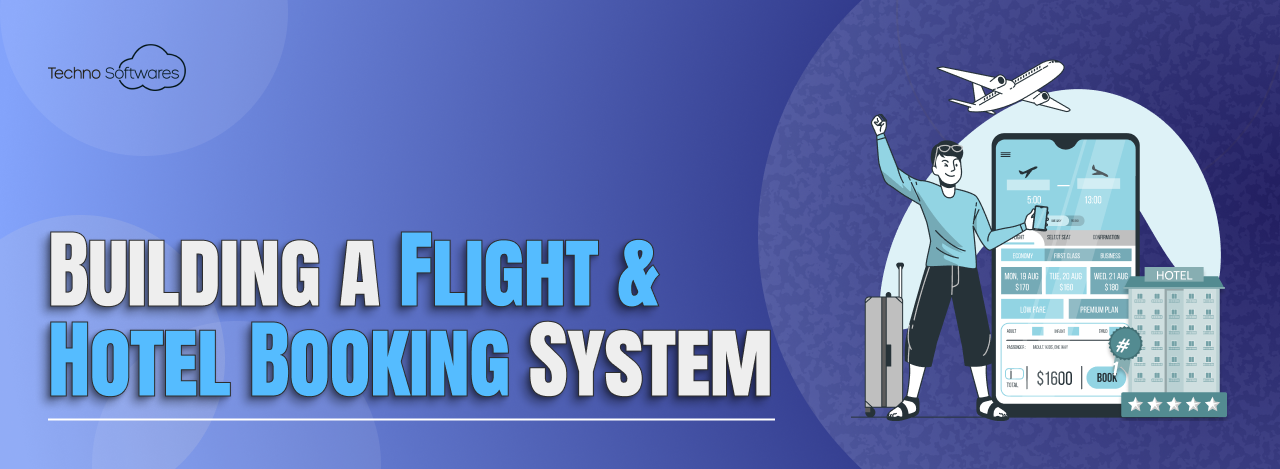How to build a Flight and Hotel Booking System
Creating a flight and hotel booking system necessitates a comprehensive understanding of the requirements that will drive its functionality and user experience. At the core of this system lies the need for a robust database that can handle vast amounts of data, including flight schedules, hotel availability, pricing, and customer information. This database must be designed to support real-time updates, ensuring that users receive the most current information when searching for flights or accommodations.
Additionally, the system should accommodate various user roles, such as travelers, travel agents, and administrators, each with distinct access levels and functionalities. Moreover, the booking system must integrate with multiple external APIs to fetch data from airlines and hotel chains. This integration is crucial for providing users with a wide range of options and competitive pricing.
The system should also include features for managing bookings, cancellations, and modifications, allowing users to have control over their travel plans. Furthermore, it is essential to consider compliance with industry regulations and standards, such as GDPR for data protection and PCI DSS for payment processing. Understanding these requirements lays the groundwork for developing a system that is not only functional but also secure and user-friendly.
Key Takeaways
- Understanding the requirements for a flight and hotel booking system is crucial for successful development.
- Choosing the right technology and platform for development is essential for scalability and performance.
- Designing a user-friendly interface for the booking system is important for a seamless user experience.
- Integrating payment gateways and security features is critical for ensuring secure transactions.
- Implementing search and filter options for flights and hotels is necessary for easy navigation and selection.
Choosing the Right Technology and Platform for Development
Selecting the appropriate technology stack and platform is a pivotal step in developing a flight and hotel booking system. The choice of programming languages, frameworks, and databases can significantly impact the system’s performance, scalability, and maintainability. For instance, using languages like Python or JavaScript can facilitate rapid development due to their extensive libraries and frameworks.
Frameworks such as Django or Node.js can streamline backend development, while React or Angular can enhance the frontend experience by providing dynamic user interfaces. In addition to programming languages, the choice of database technology is equally important. Relational databases like MySQL or PostgreSQL are often favored for their ability to handle structured data efficiently.
However, NoSQL databases like MongoDB may be more suitable for applications requiring flexibility in data storage and retrieval. Furthermore, considering cloud platforms such as AWS or Azure can provide scalability and reliability, allowing the system to handle varying loads without compromising performance. Ultimately, the right technology stack should align with the project’s goals, budget constraints, and long-term vision.
Designing a User-friendly Interface for the Booking System

A user-friendly interface is paramount in ensuring that users can navigate the flight and hotel booking system with ease. The design should prioritize simplicity and intuitiveness, allowing users to find what they need without unnecessary complexity. This can be achieved through a clean layout that organizes information logically, using clear headings and categories.
For example, a well-structured homepage might feature prominent search bars for flights and hotels, along with quick links to popular destinations or special offers. Moreover, incorporating responsive design principles is essential in today’s mobile-centric world. The interface should adapt seamlessly to various screen sizes, ensuring that users have a consistent experience whether they are on a desktop, tablet, or smartphone.
Additionally, visual elements such as icons and images can enhance user engagement by making the interface more appealing. Implementing user feedback mechanisms can also provide valuable insights into how users interact with the system, enabling continuous improvement of the interface based on real-world usage patterns.
Integrating Payment Gateways and Security Features
Integrating payment gateways is a critical component of any flight and hotel booking system, as it directly impacts the user’s ability to complete transactions securely. Selecting reliable payment processors such as PayPal, Stripe, or Square can facilitate smooth transactions while offering various payment options like credit cards, debit cards, and digital wallets. It is essential to ensure that these gateways are compatible with the system’s architecture and can handle multiple currencies if the service operates internationally.
Security features must be prioritized during this integration process to protect sensitive user information. Implementing SSL certificates ensures that data transmitted between users and the server is encrypted, safeguarding against potential breaches. Additionally, incorporating two-factor authentication (2FA) can add an extra layer of security during the login process.
Regular security audits and compliance checks with industry standards such as PCI DSS are also necessary to maintain trust with users and protect against fraud.
Implementing Search and Filter Options for Flights and Hotels
The ability to search and filter options effectively is crucial in enhancing user experience within a flight and hotel booking system. Users should be able to input their travel preferences easily—such as departure dates, destinations, number of travelers, and budget constraints—into a search bar that returns relevant results quickly. Implementing advanced search algorithms can improve the accuracy of results by considering various factors like user history and preferences.
Moreover, providing robust filtering options allows users to narrow down their choices based on specific criteria such as price range, star ratings for hotels, or layover times for flights. For instance, a user looking for a hotel might want to filter results by amenities like free Wi-Fi or breakfast included. Incorporating sorting features—such as sorting by price or distance—can further enhance usability by allowing users to view options in a manner that suits their needs best.
This level of customization not only improves user satisfaction but also increases the likelihood of conversions.
Customizing the System to Meet Specific Business Needs

Meeting Specific Business Needs
For instance, a travel agency may require additional features such as group booking capabilities or integration with customer relationship management (CRM) systems to manage client interactions effectively.
Branding and Identity
Customization can also extend to branding elements; ensuring that the system reflects the company’s identity through logos, color schemes, and overall design aesthetics.
Data-Driven Decision Making
Furthermore, businesses may have specific reporting needs that require tailored analytics dashboards to track performance metrics such as booking trends, revenue generation, or customer demographics. By implementing customizable reporting tools within the system, businesses can gain valuable insights into their operations and make data-driven decisions.
This level of customization not only enhances operational efficiency but also provides a competitive edge in a crowded marketplace.
Testing and Quality Assurance for a Seamless User Experience
Testing and quality assurance (QA) are integral components of developing a flight and hotel booking system that delivers a seamless user experience. A comprehensive testing strategy should encompass various types of testing—such as functional testing to ensure all features work as intended, usability testing to assess user interaction with the interface, and performance testing to evaluate how the system handles high traffic loads. Automated testing tools can streamline this process by allowing developers to run tests consistently throughout the development cycle.
Moreover, conducting beta testing with real users can provide invaluable feedback on potential issues that may not have been identified during internal testing phases. This feedback loop allows developers to make necessary adjustments before launching the system publicly. Continuous monitoring post-launch is also essential; implementing analytics tools can help track user behavior and identify areas for improvement over time.
By prioritizing testing and QA throughout development, businesses can ensure that their booking system meets high standards of reliability and user satisfaction.
How Techno Softwares Can Provide Expertise and Support for Building Your Booking System
Techno Softwares stands out as a leading provider of technology solutions tailored specifically for developing flight and hotel booking systems. With extensive experience in this domain, Techno Softwares offers a wealth of expertise in understanding industry requirements and translating them into functional systems that meet client needs. Their team of skilled developers is proficient in various programming languages and frameworks, ensuring that they can select the most suitable technology stack for each project.
In addition to technical expertise, Techno Softwares emphasizes collaboration with clients throughout the development process. They engage in thorough discussions to understand specific business goals and challenges before crafting customized solutions that align with those objectives. Their commitment to quality assurance ensures that every aspect of the booking system is rigorously tested before deployment.
Furthermore, Techno Softwares provides ongoing support post-launch, helping businesses adapt to changing market conditions or user feedback effectively. By partnering with Techno Softwares, businesses can leverage their knowledge and resources to build a robust flight and hotel booking system that stands out in today’s competitive landscape.
If you are looking to build a Flight and Hotel Booking System, you may also be interested in learning about software development metrics and KPIs. Techno Softwares offers valuable insights on this topic in their article Software Development Metrics & KPIs. Additionally, if you are considering offshoring vs onshoring for development projects, Techno Softwares discusses the pros and cons in their article The Pros and Cons of Offshoring vs Onshoring for Development Projects: Offshoring is Better. Lastly, if you are a small to medium-sized business looking to enhance your online presence, Techno Softwares also highlights the benefits of social media management in their article Benefits of Social Media Management for SMBs. Techno Softwares can help you navigate through various aspects of software development and digital marketing to achieve your business goals.
FAQs
What is a Flight and Hotel Booking System?
A Flight and Hotel Booking System is a software application that allows users to search, book, and manage flights and hotel accommodations. It typically includes features such as search filters, price comparison, booking management, and payment processing.
How can a Flight and Hotel Booking System benefit businesses?
A Flight and Hotel Booking System can benefit businesses by providing a convenient platform for customers to book and manage their travel arrangements. It can also help businesses streamline their booking processes, manage inventory, and increase their online presence.
What features should a good Flight and Hotel Booking System have?
A good Flight and Hotel Booking System should have features such as advanced search filters, real-time availability and pricing, secure payment processing, booking management, and integration with third-party travel suppliers.
How can Techno Softwares help in building a Flight and Hotel Booking System?
Techno Softwares is a software development company that specializes in building custom Flight and Hotel Booking Systems. They can help businesses by providing tailored solutions that meet their specific requirements, including user-friendly interfaces, seamless booking processes, and integration with various travel suppliers.





